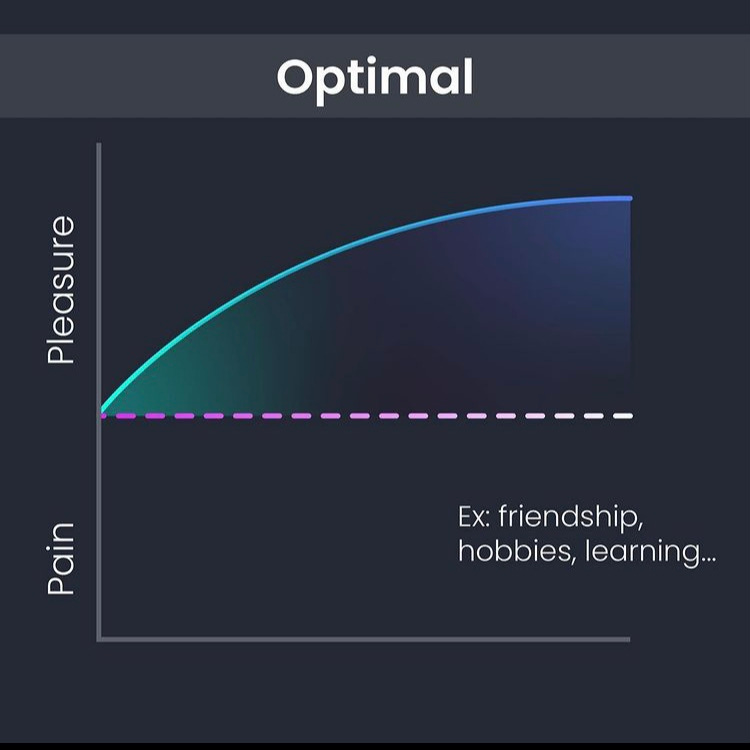Why don't we do what we know we should do?
From the Happiness PhD Project with Jackson Kerchis
The brain is not designed to keep you happy: it’s designed to keep you alive.
Let’s consider the human condition through the lens of evolutionary psychology for a moment. You have your great^200 grandparents and their buddies. Some of them are hardwired for happiness.
They roast a nice mammoth steak and say “wow this is great – I’m going to savor this for days. I’m so content, I’m going to kick my feet up and enjoy the good life.” Then they feel full and say “I don’t want to overeat and feel uncomfortable. I'll stop now.”
Then you have another group — they constantly strive for resources. The moment they get some, they eat until they can’t possibly eat another bite, then it’s on to the next thing. They are constantly scanning their environment for things that bring pleasure: food, water, sex and for things that bring anxiety: threats and dangers.
Who do you think passed on their genes?
The human brain’s primary job is keeping you alive while using as little energy as possible. This is important if you want to understand default human behavior.
We are generally wired to do what feels good (because that corresponds to keeping us alive) with as little effort as possible.
That’s why the hardest things to do are things that require additional effort/energy that don’t feel good in the short term. You can start to see that this is unfortunate. Because darn near every “good habit” falls into that troublesome category!
We are evolved for immediate return environments: avoid the tiger, eat the berries – and do it right now! And we are designed for energy preservation: once you have eaten the berries and avoided the tiger, you should sit on your ass in the shade until it’s time to eat berries and run from tigers again.
Oh simpler times…
I share this to help you understand your own mind and set your expectations. If you want to change your behavior to do more “good stuff” (more on that below) – it’s going to require a good bit of intentional effort to overcome the default.
Here’s a set of visuals to help understand this.
Most things have some sort of happiness return profile which is some balance of what we may think of as cost (effort, pain, discomfort, energy, etc.) and benefit (meaning, enjoyment, pleasure, resource accumulation, etc.).
The easiest things to do — in fact so easy we often do them when we don’t want to — are the first type above.
These generally bring an initial increase in feelings of happiness (e.g. good feeling) followed by a corresponding drop in happiness. This is the pattern of just about any indulgent or addictive behavior: porn, alcohol, nicotine, caffeine, sugar, etc.
Now I’m not trying to turn you into an ascetic monk here. If you have a glass of wine or a piece of cake once in a while it’s probably not a big deal and you’re not getting that big, long term dip in happiness.
But when you drink a bottle of wine or a few glasses every night or you eat a box of donuts or watch porn all the time you’re getting huge surges of “happiness” that will lead to a longer term “hangover”.
On the flip side you have many things that require an up front “dip,” so to speak, for longer term positive benefit. Exercise takes effort and discomfort but then you feel better. Meditation is annoying and tedious but then you are more present through the day (a proven predictor of happiness). Sitting down to tackle that daunting work project is tough but once you make progress you have a sense of accomplishment.
Then you have a category that I call optimal (again for lack of a better title). These are things that by some divine luck seem to bring happiness without much sacrifice. If you have a hobby or craft you love like painting, photography, or reading, it probably fits here. Basically things that are fun or flow inducing that don’t bring negative consequences belong here. Time with friends and family generally falls into this bucket too.
This discussion is, of course, abstract and imperfect. But it’s useful to understand (1) why it is hard to do things which we know we should do and (2) how to identify the best “sources” of happiness: things with a better balance of overall happiness.
It’s hard because we are “wired” to survive by doing what feels good now with as little effort as possible. So be prepared to engage with intentional effort to follow through on the things you know you should do.
And be weary of any substance or behavior that gives you a “high” or good feeling without any upfront effort or sacrifice. This is not a hard and fast rule, but a good frame to avoid traps. Instead lean into sources of happiness that are net positive over the long term (exercise, good food, meditation, focused work, fun, relationships, etc.).
Your happiness nerd,
Jackson K.





